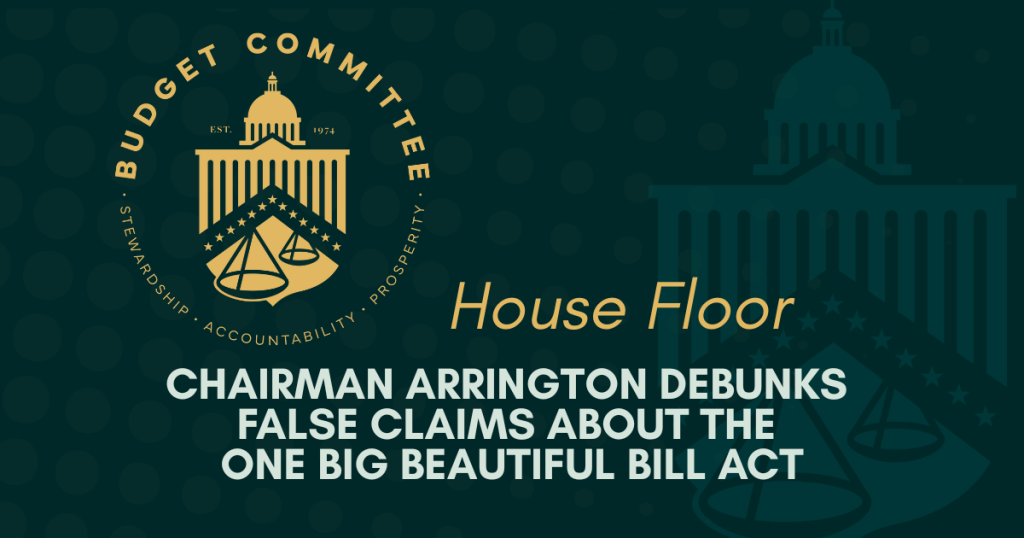Listen to the article
In a significant development from Capitol Hill, House Budget Committee Chairman Jodey Arrington (R-Texas) delivered a passionate defense of H.R. 1, the “One Big Beautiful Bill Act,” on the House floor yesterday. The comprehensive legislation aims to implement key elements of President Trump’s America First agenda while addressing concerns about fiscal responsibility.
During his address, Arrington specifically countered claims that the bill would increase the national debt, framing the legislation as a fiscally responsible alternative to Democratic spending policies of recent years.
“We have the largest tax cut, the largest spending cut, the largest investment in border and defense in the history of this country,” Arrington stated during his floor speech, highlighting what Republicans view as the landmark nature of the proposal.
The Texas Republican drew sharp contrasts between the current Republican-backed legislation and previous Democratic initiatives, particularly the Inflation Reduction Act passed during the Biden-Harris administration. Arrington claimed Democrats added $8 trillion to the national debt through expanded government programs, increased IRS staffing, and green energy subsidies over the past four years.
“When they had the tool of budget reconciliation and unified Democrat leadership, that’s what they offered to the American people: more spending, more debt, more government and less freedom,” Arrington asserted.
The chairman positioned the Republican bill as fundamentally different, focusing on national security investments, tax relief for working families, and economic growth incentives. According to Arrington, the legislation prioritizes border security and defense spending based on the principle that “the safety and security of the American people is job number one.”
A key point of contention addressed by Arrington involves growth projections used to score the bill’s fiscal impact. He dismissed criticism that relied on Congressional Budget Office (CBO) baseline growth assumptions of 1.8%, which he characterized as overly conservative and reflective of recent economic policies.
Instead, Arrington defended the bill’s use of a 2.6% annual average growth rate, which he described as a “conservative number” based on historical performance rather than predictive modeling. He noted that this growth assumption would generate an estimated $2.5 trillion over the ten-year budget window, which combined with spending reforms, would offset costs associated with border security, defense spending, and tax reductions.
“If you stack the spending reforms—which by the way, are the deepest cuts by two times in our nation’s history—and you add the two, you totally offset the cost of border, of defense, and any cost associated with reducing taxes,” Arrington explained.
The legislation represents a significant policy shift that Republican lawmakers believe will stimulate economic growth through energy policies, work incentives, deregulation, trade policies, and tax provisions. Arrington emphasized that even a modest increase in economic growth could substantially reduce the deficit, stating that “one percent growth over the projections of CBO is $3 trillion against the deficit.”
Market analysts note that the bill’s passage would have wide-ranging implications for multiple sectors, particularly energy, defense, and border security industries. The proposed changes to tax policy could also significantly impact corporate planning and investment strategies if enacted.
The “One Big Beautiful Bill Act” comes at a time of heightened concern about the national debt, which recently surpassed $34 trillion. Its reception has largely followed partisan lines, with supporters viewing it as a necessary correction to previous fiscal policies and critics questioning its growth assumptions and spending priorities.
As the legislation moves through the congressional process, its ultimate impact on the federal budget, national debt, and broader economy remains a central point of debate among lawmakers, economists, and policy experts.
Verify This Yourself
Use these professional tools to fact-check and investigate claims independently
Reverse Image Search
Check if this image has been used elsewhere or in different contexts
Ask Our AI About This Claim
Get instant answers with web-powered AI analysis
Related Fact-Checks
See what other fact-checkers have said about similar claims
Want More Verification Tools?
Access our full suite of professional disinformation monitoring and investigation tools




11 Comments
As someone who works in the uranium industry, I’ll be keeping a close eye on how this bill addresses that critical mineral. Stable policy is essential for long-term investment in the nuclear fuel cycle.
From an environmental standpoint, I’m concerned about any provisions that could weaken regulations or oversight in the mining and energy industries. Those sectors need to be part of the climate solution, not obstacles.
Interesting to see Arrington defend this bill so forcefully. I’ll have to review the details to form my own opinion, but it sounds like a major shift in fiscal policy from the previous administration’s approach.
Agreed, the contrast with the Inflation Reduction Act is notable. I’m curious to see how this bill is received and what the long-term budget impacts would be.
I’m always cautious about claims of ‘the largest X in history’ – those tend to be rhetorical flourishes rather than substantive policy analysis. But I’ll reserve judgment until I see more details.
I’m a bit skeptical of Arrington’s claims about fiscal responsibility, given the track record of recent Republican-backed bills. But I’m open to seeing the details and analysis from independent sources.
That’s a fair perspective. It will be important to scrutinize the budget projections and trade-offs rather than take the sponsor’s word at face value.
As an investor in mining and energy stocks, I’m curious to see how this legislation could impact commodity prices and company valuations. Increased border/defense spending and tax cuts could be a mixed bag.
Good point. Any changes to regulations, permitting, or incentives in those sectors could significantly move the needle. Definitely an issue to watch closely.
As someone who follows mining and energy issues closely, I’m intrigued by the potential impacts of this legislation on those sectors. The focus on border security and defense spending could have ripple effects.
Good point. The mining and energy industries will be watching this closely, especially any provisions related to critical minerals, permitting, or infrastructure investment.